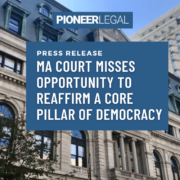SJC Affirms Summary Judgment in Immigrant Entrepreneur Case
Pioneer Law Center filed amicus brief on behalf of immigrant property owner
BOSTON, August 17, 2023 – Massachusetts’ Supreme Judicial Court (SJC) has affirmed a summary judgment granted by the Superior Court in Norvella Hill-Junious v. UTP Realty, LLC, a case in which the Pioneer Public Interest Law Center (PPILC) filed an amicus brief.
This case involved Vietnamese immigrant Uyen Phan, who owned and operated a nail salon in Randolph. To protect her successful business, she bought the shopping plaza in which it operates, which included the City Limits Saloon, a nightclub where some violent disturbances had occurred.
On February 17, 2017, about three months after Uyen purchased the shopping plaza, there was an execution-style murder in the parking lot of the City Limits Saloon.
The decedent’s mother sued Uyen and UTP Realty, alleging that the murder was foreseeable and that owners of commercial real estate have a duty to implement measures to prevent such foreseeable crimes on the premises.
The SJC upheld the Superior Court’s grant of summary judgment for the defendants, finding that such an act was not foreseeable. The SJC determined that the plaintiff offered no precedent to support her claim that commercial landowners have a duty to inquire about any history of criminal activity on their properties.
PPILC’s brief argued that a ruling in favor of the plaintiffs would have had an outsized negative impact on immigrant entrepreneurs because they tend to own property in transitional neighborhoods. The cost of owning such property would rise dramatically, as owners would need to equip the premises with nearly full-time security, which might foreclose the ability of immigrant entrepreneurs to acquire commercial property.
“Immigrants investing in commercial property located in marginal neighborhoods bring jobs and development to those locations,” said PPILC President Frank Bailey. “Investing in real property is also an important step toward achieving the American dream by creating equity and family wealth for immigrant investors.”



